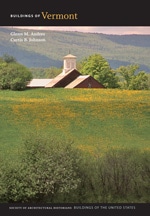
The architects of the new library faced difficult challenges—accommodating the changing needs of library and information technology services, inserting a large building into the historical front campus, and creating an exterior that is at once contemporary and contextual. They addressed the first with a great hall that opens onto three floors of loft-like stack and technology spaces wrapped by a mezzanine perimeter of offices and study carrels. The modern interiors are warmed by the use of certified woods harvested from local forests as part of the college's program of environmentally conscious building. The architects addressed the second challenge by setting the building into the hillside and making it a compact object that floats below Old Stone Row rather than being a fourth side to a quadrangle. The semicircular form of its uphill side reinforces the arc-shaped flow of space between the row and the village while also invoking the imagery of rotunda libraries initiated by Thomas Jefferson at the University of Virginia. It is tied to the structure of the campus above by its placement as the anchoring terminus of Storrs Walk. To adjust the facades to the scale and materials of the historic campus, the architects manipulated their characteristic modernist geometries to create individually readable units (picked out in marble against a more textured stone body) that resonate with the colors and proportions of the nearby Painter and Warner halls.

